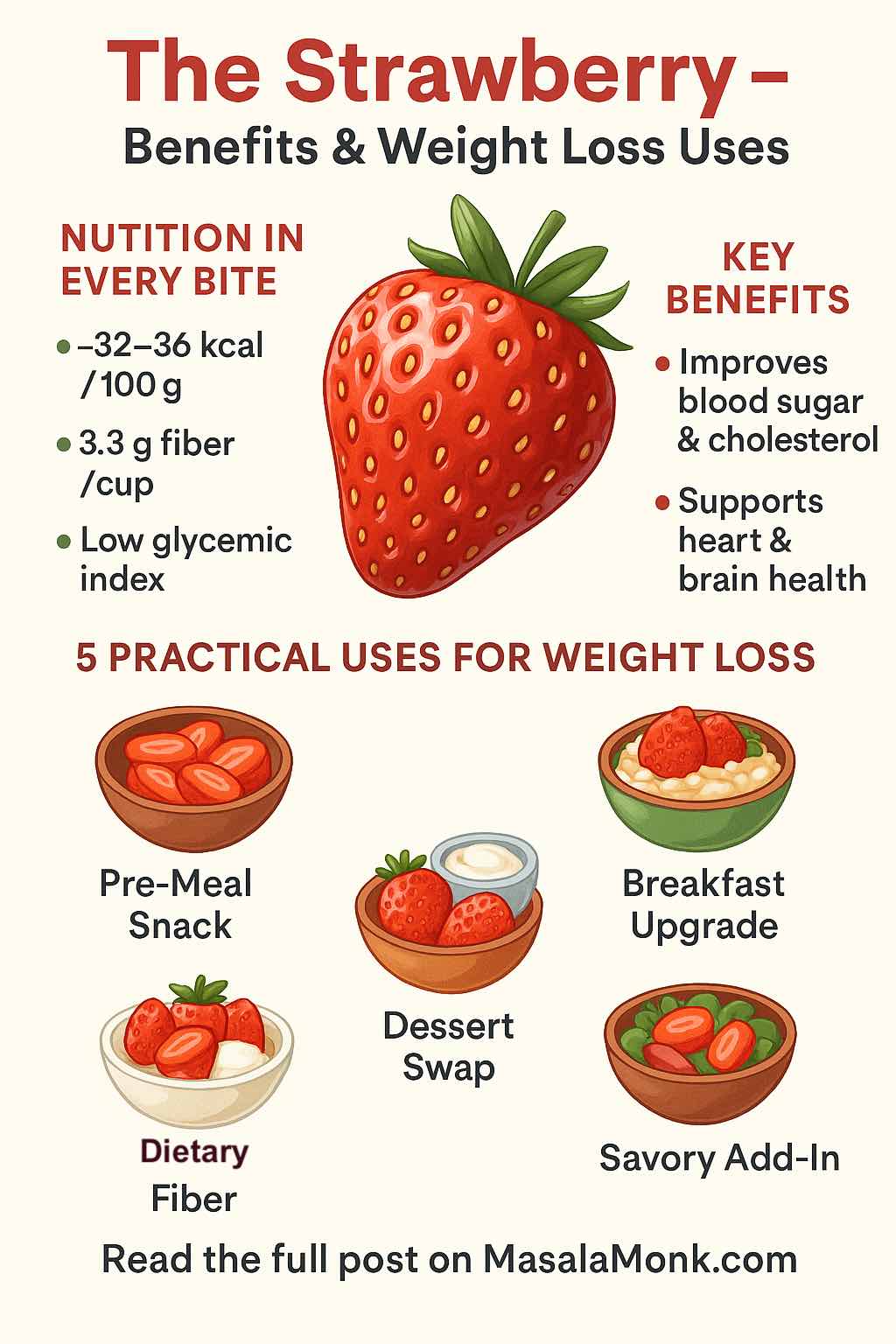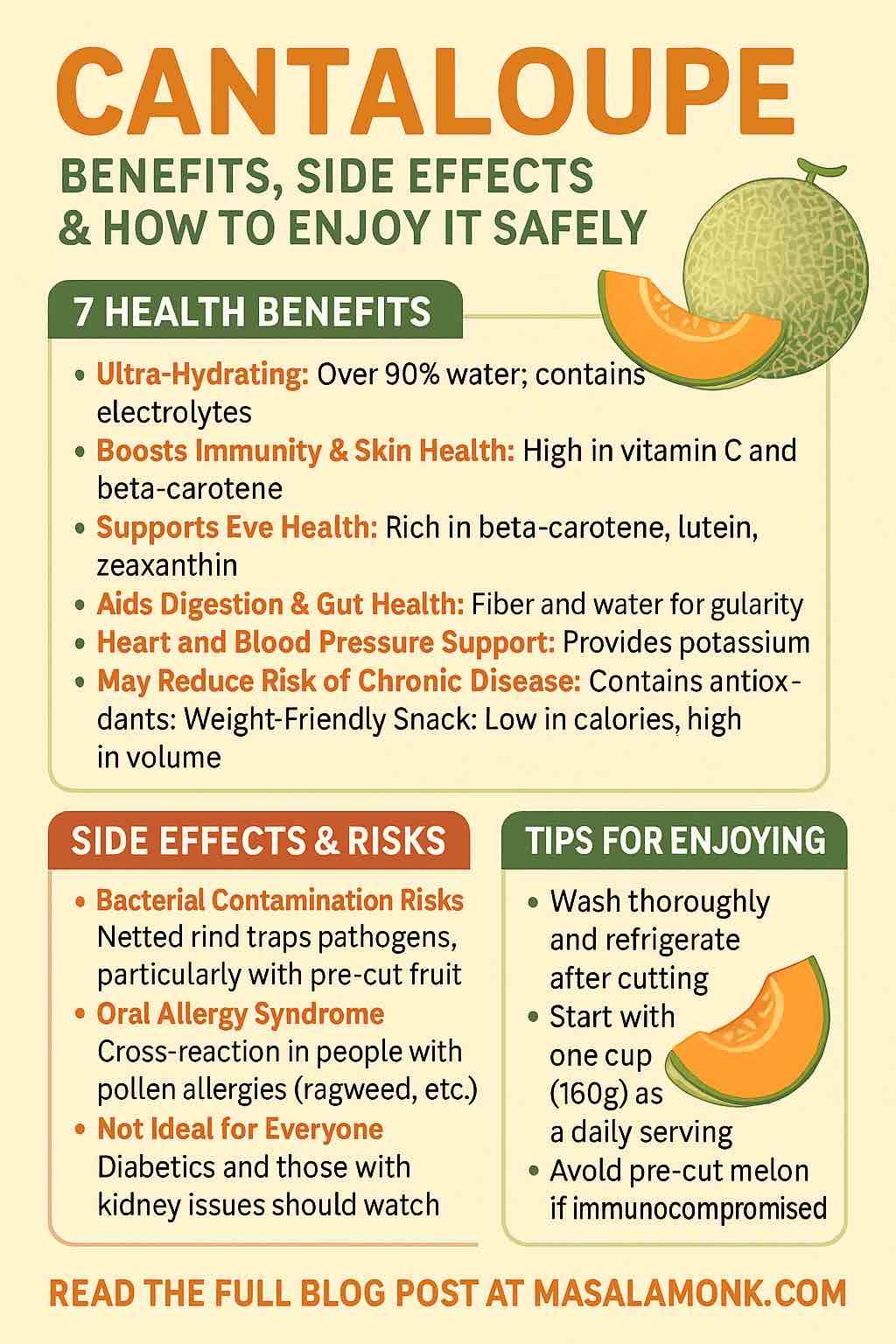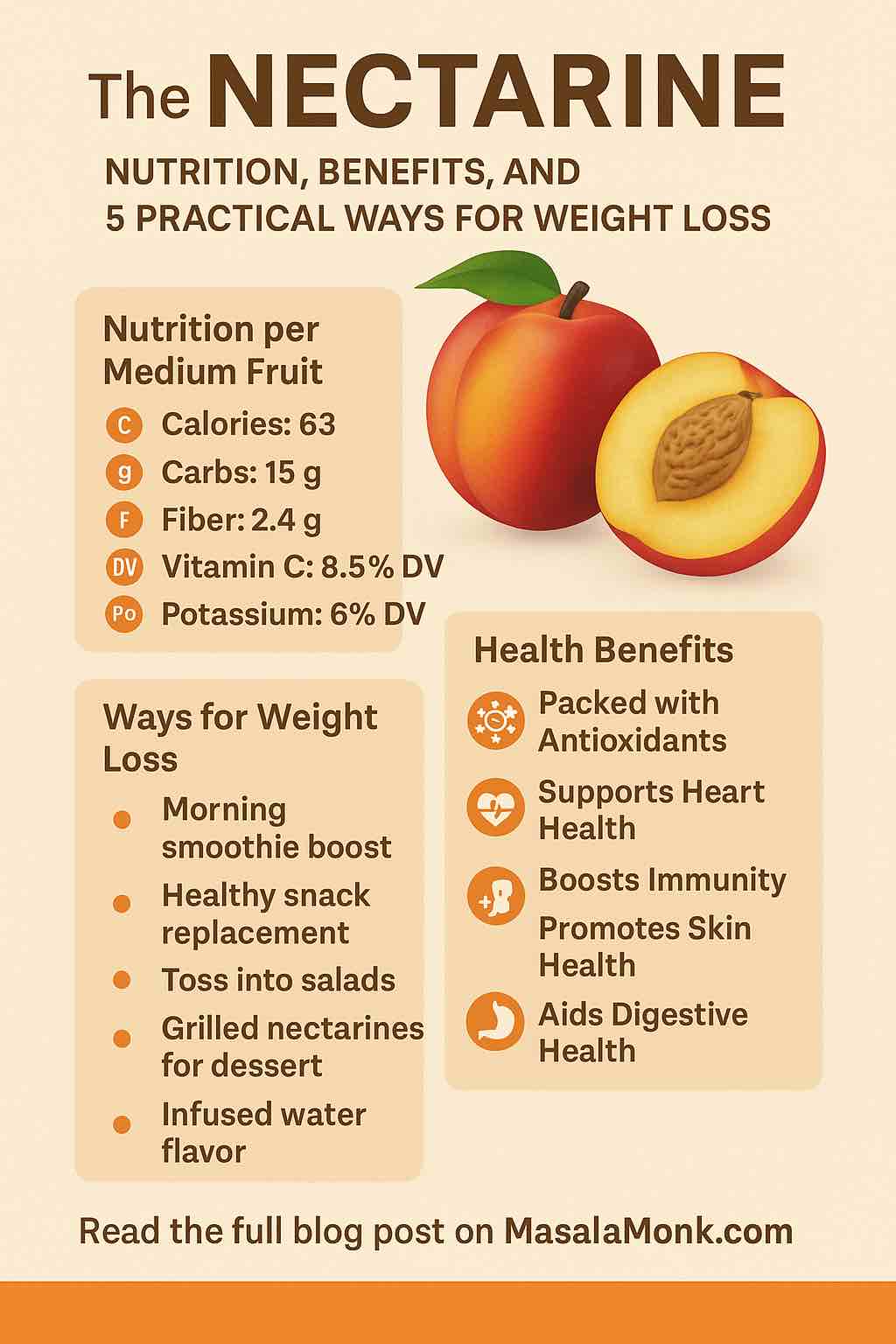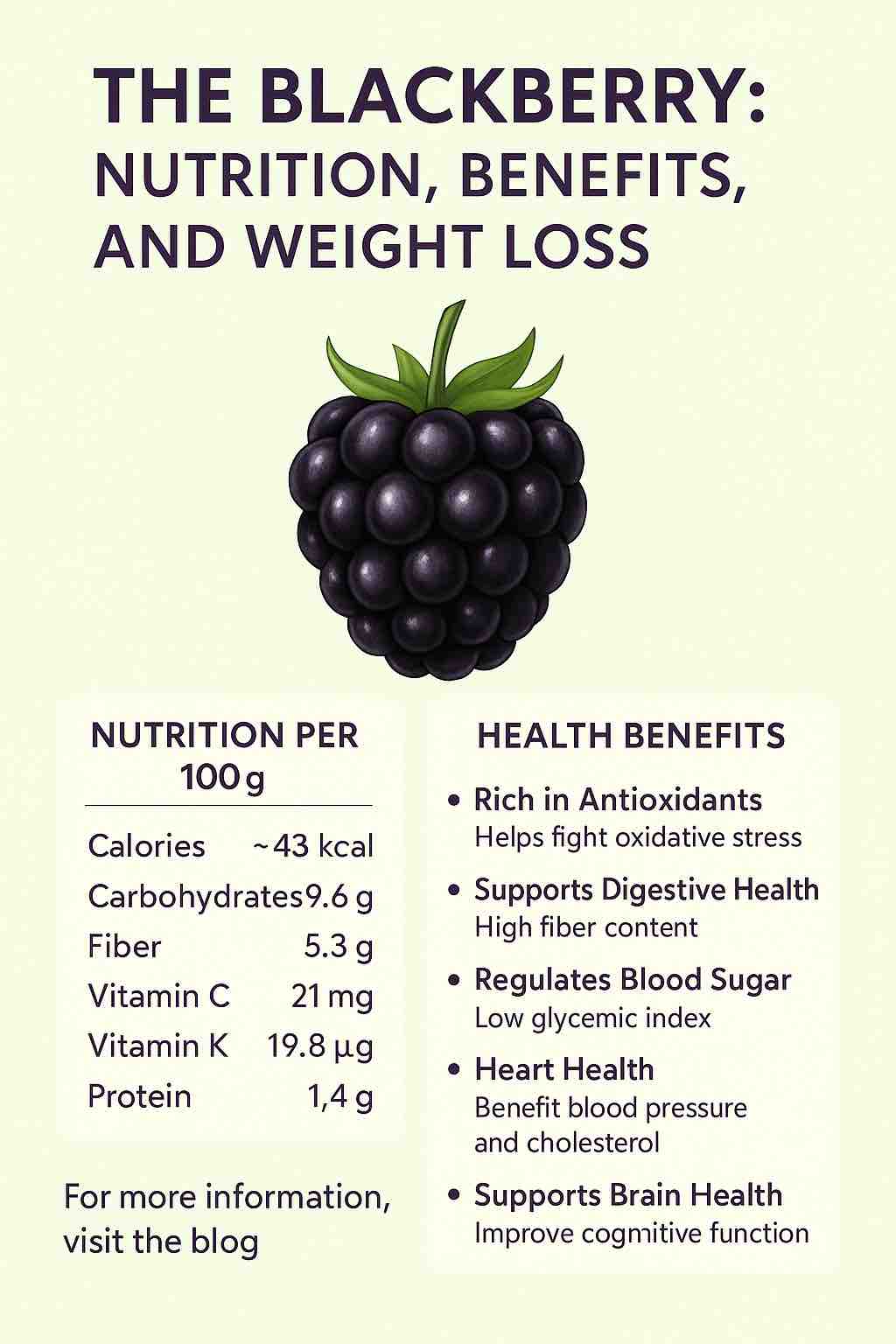
There’s something magical about strawberries.
That burst of sweetness. The refreshing juiciness. The way a small handful can transform a plain bowl of dahi into a café-style parfait.
But strawberries aren’t just eye candy for your Instagram feed. They’re quietly becoming the darling of nutrition science. New studies in 2025 show that strawberries may help balance blood sugar, reduce cholesterol, ease inflammation, and even sharpen brain speed. And yes—done right—they can support your weight-loss journey without making you feel deprived.
Let’s take a fresh, detailed look at why this humble berry deserves a regular spot on your plate.
🥗 What’s Inside a Strawberry? (Nutrition in Every Bite)
Strawberries are often called “nature’s candy”, but nutritionally they’re closer to a superfood.
- Calories: ~32–36 per 100 g (about 5–6 medium berries)
- Water: ~91% — this is why they feel so light and refreshing
- Carbohydrates: ~8 g
- Fiber: ~3.3 g per cup (166 g) – your gut will thank you
- Protein: ~0.6 g (tiny, but every bit counts)
- Fat: <0.5 g
- Vitamin C: ~97 mg per cup (~100% of your daily needs)
- Potassium: ~254 mg (good for heart and muscles)
💡 Fun fact: Just 8 medium strawberries = more vitamin C than an orange.
And unlike most sweet treats, strawberries are low GI (~40)—meaning they don’t spike your blood sugar much. That’s a big win if you’re trying to manage weight, diabetes, or cravings.
🌟 Science-Backed Benefits (The 2025 Update)
1. Blood Sugar & Metabolic Health
This is where strawberries shine.
A gold-standard clinical trial (2025) gave people with prediabetes about 2.5 cups of strawberries daily (≈400 g) for 12 weeks. Results?
- Lower blood sugar
- Better insulin sensitivity
- Reduced cholesterol
- Less inflammation (CRP & IL-6 down)
- Even a little weight loss
👉 This isn’t theory—it’s human trial data. A berry bowl a day could genuinely help prevent diabetes.
Do try Best Homemade Fresh Strawberry Popsicle Recipe
2. Heart-Friendly Fruit
Strawberries may be tiny, but they pack heart power:
- Improve “good” HDL cholesterol
- Lower “bad” LDL cholesterol
- Reduce blood pressure modestly (shown in 2025 trials with older adults)
- Contain potassium & polyphenols that keep arteries more relaxed
No wonder regular berry eaters are less likely to suffer heart attacks.
Have a look at Quick Strawberry and Apple Preserve- Healthy Kid Friendly Recipe
3. Brain Boosting
In the same 2025 trial, participants who had two servings daily showed faster cognitive processing speed. Imagine feeling sharper, more alert, and mentally younger—all from a fruit you can snack on guilt-free.
Researchers suspect this comes from anthocyanins (the red pigments), which fight oxidative stress and improve blood flow to the brain.
4. Gut Health & Anti-Inflammatory Effects
The strawberry story gets even juicier in your gut.
Strawberries are rich in ellagitannins. Your gut microbes convert them into urolithins, compounds that may calm inflammation and improve metabolism. Think of strawberries as a prebiotic fruit with benefits that ripple through your whole system.
Do not miss Strawberry Cocktails Turned Mocktails – 5 Easy Mocktails you can make at Home
5. Weight Management
Strawberries tick all the right boxes for weight control:
- Low in calories but high in volume (91% water!)
- Rich in fiber → slows digestion & keeps you fuller longer
- Naturally sweet → curbs dessert cravings without a sugar overload
When you swap out calorie-dense desserts for a cup of strawberries, your body (and bathroom scale) will notice.
Might have to have a look at Discover the 10 Most Expensive Strawberries Grown in the United States of America
🍓 5 Practical, Delicious Ways to Use Strawberries for Weight Loss
Alright, enough science. Let’s get practical. How can you make strawberries work for you—every single day?
1. Pre-Meal Snack Trick
Try eating 1 cup of strawberries 10–15 minutes before lunch or dinner.
- The fiber + water fills your stomach.
- You naturally eat less of the main meal.
- Studies show this “preload” effect can reduce calorie intake without you even realizing.
2. Protein-Fiber Combo Snack
Pair strawberries with Greek yogurt, dahi, or a handful of paneer cubes.
- Balances carbs with protein.
- Keeps blood sugar stable.
- Makes for a creamy + fruity snack you’ll crave more than junk food.
Do Read: How to Eat 100 Grams of Protein a Day
3. Breakfast Upgrade
Instead of sugary cereal toppings, add strawberries to:
- Overnight oats
- Chia pudding
- Even poha-upma fusion bowls
They brighten up the plate, add crunch and fiber, and cut your breakfast calories while adding nutrition.
4. Dessert Swap
When the sweet tooth hits:
- Try fresh strawberries dipped in a little dark chocolate.
- Or strawberries + yogurt + cinnamon.
- Or just sliced strawberries sprinkled with a hint of black salt (yes, it works!).
The satisfaction is real. The calories? Way lower than gulab jamun or ice cream.
Do Read: Embrace Sweet Satisfaction with 5 Irresistible Low Carb Strawberry Dessert Ideas
5. Savory Desi Twist
Strawberries in salad aren’t new—but have you tried them in kachumber?
Mix them with cucumber, onion, lemon juice, and a pinch of chaat masala.
Or toss them into quinoa bhel or a light chaat bowl.
👉 The sweet-sour combo balances spicy flavors while keeping things light.
Also Read: Meal Prepping with Strawberries: The Nutritious and Delicious Solution for Busy Lives
⚠️ Who Needs to Be Careful?
Strawberries are safe for most—but a few things to note:
- IBS/FODMAP-sensitive people: Small portions (~5 berries) are usually safe. Larger bowls may cause bloating.
- Oral Allergy Syndrome: If you’re allergic to birch pollen, you might react. Cooked strawberries are usually safe.
- Pesticides: Strawberries rank #2 on the “Dirty Dozen” list for pesticide residues. Always wash well, and buy organic/local if possible.
- Food safety: Be cautious with frozen imported strawberries—there have been hepatitis A outbreaks linked to them in recent years.
🛒 Shopping, Storage & Indian Context
- In India: The famous Mahabaleshwar strawberry (GI-tagged) rules the market. Peak season: December to February.
- Storage: Keep in fridge, unwashed, and rinse just before eating. Best consumed within 2–3 days.
- Festival fun: If you’re ever near Mahabaleshwar, the annual Strawberry Festival (March–April) is a must—strawberry cream, jams, wines, and more.
🎯 The Takeaway
Strawberries aren’t just pretty—they’re powerful.
- One cup a day is an easy, sustainable habit.
- For people targeting blood sugar and cholesterol improvements, clinical trials suggest ~2.5 cups/day for 12 weeks can make a measurable difference.
Also Read: How Strawberries Can Give You a Whiter Smile – Naturally!
At MasalaMonk, we believe in foods that are both delicious and backed by science.
So, the next time you’re tempted by a high-calorie dessert, remember: a simple bowl of strawberries could be the sweetest step you take toward better health. 🍓
❓ 10 Frequently Asked Questions About Strawberries & Weight Loss
1. Are strawberries good for weight loss?
Yes! Strawberries are low in calories (~32 kcal per 100 g), high in water (91%), and provide fiber that keeps you fuller for longer. They make an excellent swap for high-calorie desserts and snacks, helping reduce overall calorie intake.
2. How many strawberries should I eat per day for weight loss?
For general health and weight loss, 1 cup (150–160 g) daily is a good target. Clinical studies show that about 2.5 cups/day (≈400 g) for 12 weeks improved blood sugar, insulin sensitivity, and cholesterol in people with prediabetes.
3. Do strawberries raise blood sugar?
No, strawberries are a low GI fruit (~40), which means they have a mild impact on blood sugar. They are safe for most people with diabetes when eaten in moderation.
4. Can strawberries really reduce belly fat?
Animal and human studies suggest strawberries may help reduce abdominal fat by improving insulin resistance and lowering inflammation. While they are not a “fat-burning food,” including them as part of a balanced diet can support overall fat loss.
5. When is the best time to eat strawberries for weight loss?
- Before meals (as a preload snack) helps reduce calorie intake.
- With protein-rich foods (like yogurt, paneer, or oats) balances blood sugar and prolongs satiety.
Avoid eating large amounts late at night with added sugar or cream.
6. Are strawberries safe for everyone?
Mostly, yes. But:
- People with IBS/FODMAP sensitivity should stick to small portions (~5 medium berries).
- Those with Oral Allergy Syndrome may react to raw strawberries.
- Wash well to reduce pesticide exposure.
7. Are Indian strawberries healthy too?
Absolutely. The Mahabaleshwar strawberry (GI-tagged) is nutrient-dense and grown locally in India. Seasonal, fresh berries often taste sweeter and may have better antioxidant profiles than imported ones.
8. Can I eat strawberries if I have diabetes?
Yes. Because of their low glycemic index and high fiber, strawberries can be part of a diabetes-friendly diet. Pairing them with protein (like curd or nuts) is even better for stable blood sugar.
9. What’s the healthiest way to eat strawberries?
- Fresh and whole (best for satiety)
- Added to salads, yogurt, or oats
- As a dessert swap instead of sugary mithai or ice cream
Avoid sugar-loaded strawberry syrups or processed jams if your goal is weight loss.
10. How should I store strawberries to keep them fresh?
- Keep them in the fridge, unwashed, and rinse only before eating.
- Eat within 2–3 days for best quality.
- For longer storage, freeze them (but note texture changes).












